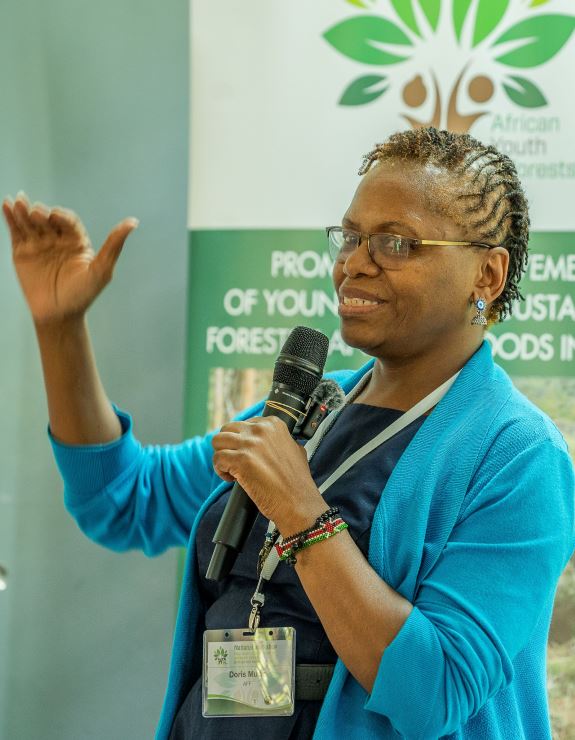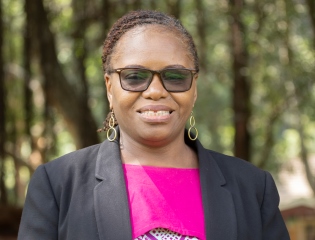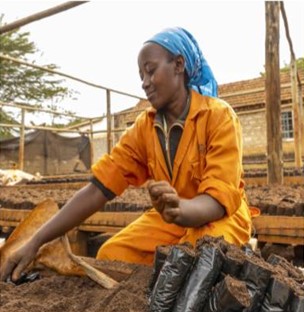Our Goals
500,000+
AFF Members
500+
AFF Staffs
50+
Africa Forest Enhancement
Delineation and goal of AFF’s work
The overall goals are to: i) to build up and apply an effective system for generating, accessing and making available relevant knowledge and information, and, ii) to assess what impact AFF’s interventions have.
In this thematic area, AFF will work on the collation, synthesis and provision of access to critical information and knowledge required by, and adapted to the unique needs of, various stakeholders in African forestry, as well as providing information to support decision- and policy-making for enhancing SFM at national, regional and continental levels. In addition, AFF will develop efficient tools to monitor and assess impact of its own and others’ programmes.

Context
As more stakeholders in Africa get involved with forest and tree management for a variety of goals – economic production, positive interactions with agriculture, environmental services, etc. - the demand for relevant and reliable information and knowledge is growing. Achieving SFM in Africa is particularly constrained by poor access to relevant knowledge and technologies, partly because its current availability is fragmented, and suppliers and users extremely diverse. The situation is worsened by the fact that there are very limited knowledge products specifically targeted towards stakeholders outside the forestry profession (i.e. communities, farmers, rural entrepreneurs, etc.). In the absence of systematic and targeted management of, and access to, technical knowledge, projects and programmes are not learning from previous experiences. In addition, a significant amount of data and information used in Africa is accessed from sources outside the continent, and in many instances such data, information and knowledge are used as proxies in making decisions in Africa with the obvious result that there is often poor matches between technologies and needs.
Knowledge brokerage (KB) can play an important role in managing these gaps and in supporting stakeholders within and outside the forestry sector to access relevant and timely information. KB is broadly defined as a set of intermediary activities that link knowledge production and use. KB can range from making information more accessible and understandable to helping different actors develop a shared understanding of an issue. The intent is to help decision-makers acquire, evaluate and use expertise that they would not otherwise obtain or incorporate into their decision-making. The rapid developments in ICT offer an unprecedented range of possibilities for improved and more efficient and relevant KB, offering greater reach, more access and new technologies for storing, filtering and translating knowledge into new formats.
Examples of subjects, challenges and opportunities to be addressed
Gathering information; continuing process of gathering useful and relevant data of improved quality from concluded, on-going and planned projects and programmes, from both AFF’s own activities and those by other relevant actors; determine knowledge needs of Africa’s forest sector on an on-going basis and select relevant and reliable data and information that meet the needs of different actors; interconnect different international, regional and national forestry resources information systems to enable efficient ways of data access.
Disseminate information; analyse, disaggregate and make available in user-friendly form (adapted to different user groups, incl. non-forestry professionals) existing data, information and user-designed knowledge products; further develop and improve tools (IT, data-bases, media, publications, etc.) and capacities within AFF for dissemination of information; evaluate global, regional and national forestry financing opportunities and link them to stakeholders at relevant levels.
Impact assessment; develop effective tools and mechanisms to monitor, assess and follow up on uptake, outcomes and impacts of AFF’s products and services, and report to appropriate constituencies.

News
View More
AFF's workshop goes to Cameroon
Staff

Doris Mutta
Events
See AllSeventh session of the UN Environment Assembly (UNEA-7)
30th United Nations Climate Change Conference 2025 (UNFCCC COP30)
Knowledge Products
View MoreImpact Stories
View More

Forest conservation and management
The African Forest Forum (AFF) was set up in 2007 to generate knowledge and build capacity for the vital task of protecting forests, sustaining use and management of its resources as the continent was developing. Over the years its membership has grown tremendously, to include great minds in science, conservation, sustainable development, focused on creating livelihoods and maintaining ecosystems.

